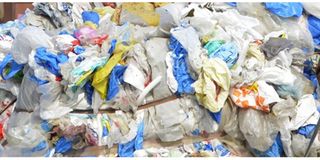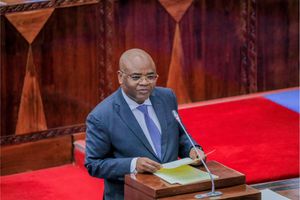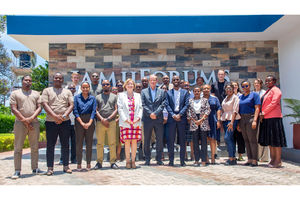Nemc, TBS in fresh move to curb use of plastic bags

What you need to know:
- The plastic bag issue arose during a meeting between Nemc and TBS with environmental stakeholders, including local leaders, market leaders, bar and lounge owners, and plastic bag importers and producers, among others, to get their perspectives on noise, vibration, and plastic bag pollution in the city
Dar es Salaam. The National Environment Management Council (Nemc) and the Tanzania Bureau of Standards (TBS) have launched a series of activities to combat the resurgence of plastic bags following a ban.
Except for certain packaging materials, the government banned plastic bags in 2019.
However, plastic bags have recently resurfaced in public locations, posing a potential return to the previous situation, which created environmental hazards.
The plastic bag issue arose during a meeting between Nemc and TBS with environmental stakeholders, including local leaders, market leaders, bar and lounge owners, and plastic bag importers and producers, among others, to get their perspectives on noise, vibration, and plastic bag pollution in the city.
Dr Samuel Gwamaka, director general of the NEMC, stated that the use of plastic bags had reappeared in most locations, far beyond the permissible usage.
“All plastic bags are harmful to the environment, but we allow them to be used in products that cannot be stored otherwise (milk, medicine etc),” Dr Gwamaka explained.
“We will request that producers and importers register all of their buyers as well as the amount they buy, and all products should have batch numbers so that we can easily locate them,” he said.
Dr Gwamaka added that plastic bags should not be used in markets, butcheries, and shops, insisting that it is illegal, and those who go against that for producers and importers will face penalties ranging from Sh20 million to Sh1 billion or imprisonment, while other users will face a fine of Sh20,000 to Sh200,000 or a three-month jail term. The managing director of Commercial Plastic, a plastic bag manufacturing plant based in Dar es Salaam, Mr Murad Muhammad, said the new directives are confusing and that the plastic bags they are producing had been approved by TBS but are now illegal.
“We don’t understand these directives because we produce products legally, but now they are illegal,” he said.
To clear up the confusion, TBS director general Dr Athumani Ngenya said from now on they will not approve any plastic bag manufacturing licences before Nemc notification. “We prepared standards after Nemc allowed some plastic bags. But now we call for all new manufacturers and those who come for licence renewal to bring Nemc approval before we allow them,” he said.
After hearing the arguments, the Dar es Salaam Regional Commissioner, Mr Amos Makala, gave the institution an ultimatum of 16 days until May 1, 2023, before it starts an inspection.
“I know my people, so please give us these two weeks. The first week, I request Nemc to provide awareness in all the districts in Dar es Salaam, and the next week, engage the media to give more awareness to people,” he said.
Mr Makala further called for all manufacturers, importers, and wholesalers of plastic bags who have stocks that don’t meet the standards to surrender their products before the inspection.
Dr Gwamaka also noted that the environmental agency will give a reward of Sh1 million to anyone who gives information about illegal producers and promised that they will keep the privacy of whoever gives the report.
He also requested that the information be delivered to the Nemc leaders in the respective districts or main office and added that he would give his phone numbers to stakeholders who would be able to give him information that way.
He then pointed out that the inspection will cover all parts of Dar es Salaam with no discrimination, following the concerns of various market leaders.
Kigamboni market chairperson Athumani Makono raised a concern that the inspection is selective to marginal markets only and other big markets are not inspected.
In the 2019 inspection, many of our people were held accountable and some lost their capital, but that was not the city in the city centre markets,” he said.





